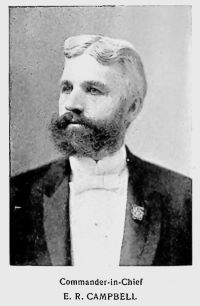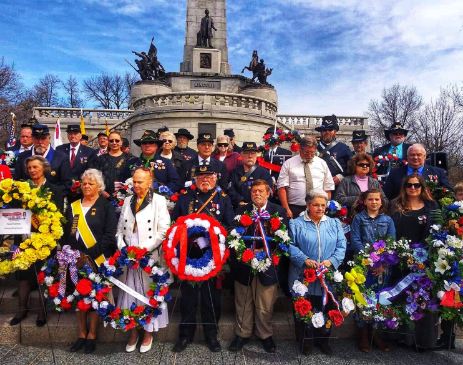Edward R Campbell
Edward Romanzo Campbell was born on January 29, 1844 in Londonderry, Vermont. In 1881, he moved to the Washington D.C. area.
His father, Abner T., served with Co. G, 1st Vermont Heavy Artillery from November 30, 1863 to February 15, 1864. He died of typhoid pneumonia while at a Washington D.C. area hospital.
Edward enlisted on July 5, 1862 with Co. G, 1st Vermont Volunteer Heavy Artillery and later was with the 2nd Vermont Infantry. He participated in 13 battles and was rushed from City Point, Virginia to Fort Stevens to defend the Capital from the threat by Gen. Jubal A. Early. He mustered out on May 13, 1865.
He joined the Grand Army of the Republic with the Burnside Post 8, Washington D.C.
Edward joined the Sons of Veterans as a member of the William B. Cushing Camp 30, Washington D.C. He was the Maryland Division Colonel in 1890. He was among the first of the Sons of Veterans Reserve staff officers, being appointed Asst. Inspector General in 1903.
The 1901 election for Commander-in-Chief was hotly contested. Four Brothers were nominated and Campbell received 67 votes, Frank Martin (ID) got 30, Edward K. Gould (ME) got 28, and George Addington got 23. None of the candidates received a majority of 75 votes. A second ballot was needed and Campbell got 84, Martin got 26, Gould got 20, and Addington got 18. Campbell was the new Commander-in-Chief.
He was employed in the Bureau of Pensions from 1882 to 1925. He also held a commission as 1st Lieutenant signed by the Governor of Vermont, Captain of the National Guard signed by President Cleveland, and Major signed by President Harrison. He served nine years in the Fourth Battalion, District of Columbia National Guard.
Edward was a member of the St. Paul Lodge 25, Brandon, Virginia, F.A. and A. M., and a thirty-third degree Mason.
He married Harriet Haywood and they had one daughter.
Brother Campbell died on March 10, 1936 and is buried in Battle Ground National Cemetery in Washington D.C. He was the only survivor of Fort Stevens who chose to be buried with his long dead comrades and his burial closed the cemetery. And, at the time of his death, he was believed to be the last survivor of the 6th Army Corps.







